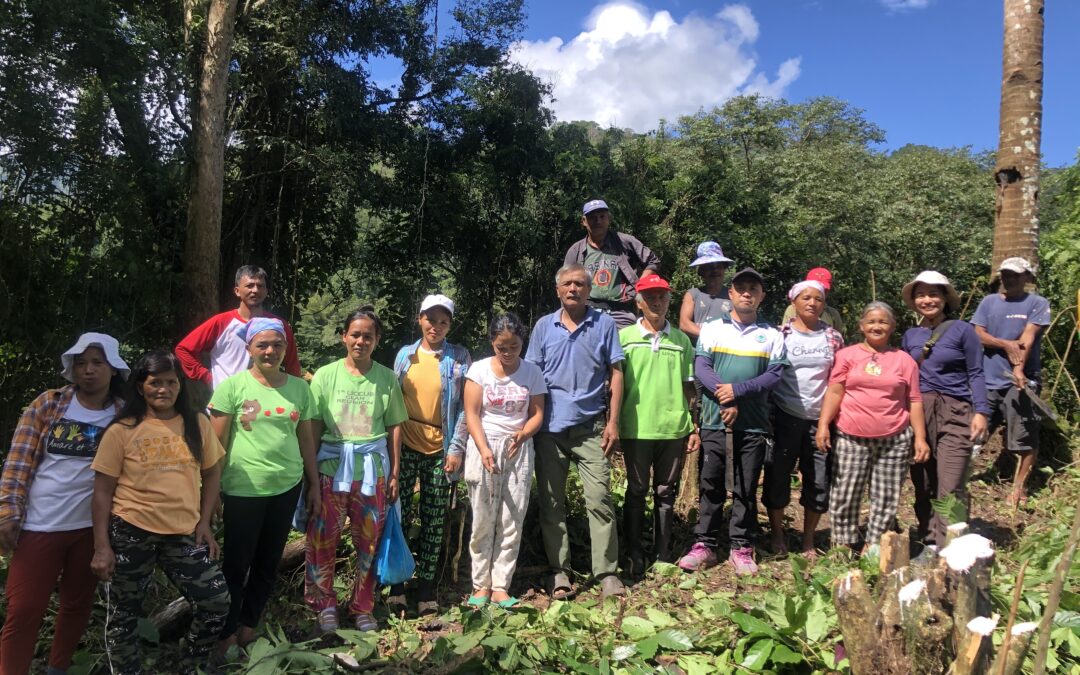Tanglag Coffee Farmers Enhance Rejuvenation, Processing, and Marketing Skills Through CorDisRDS and KSU Training
Lubuagan, Kalinga — More than 20 coffee farmers from Tanglag, Lubuagan, participated in a two-day Coffee Rejuvenation, Harvesting, Processing, and Marketing Training facilitated by the Cordillera Disaster Response and Development Services, Inc. (CorDisRDS) in partnership with the Kalinga State University–Coffee Research Center (KSU-CRC) on October 24–25, 2025.
The training, led by Forester Jefferson A. Himson of KSU-CRC, aimed to enhance the knowledge and practical skills of coffee farmers in rejuvenation, farm management, harvesting, and processing to improve the quality and marketability of their produce.
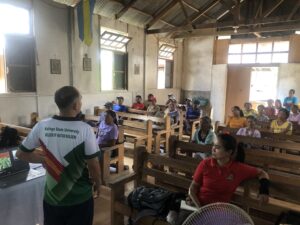
Forester Jefferson A. Himson begins his lecture on coffee rejuvenation techniques.
A Continuing Support for Tanglag’s Coffee Farmers
This training builds on CorDisRDS’s earlier livelihood assistance in the area. On July 26, 2025, CorDisRDS delivered a coffee dehuller to Tanglag, Lubuagan—a machine requested by the community through their people’s organization.
Hands-On Learning and Practical Insights
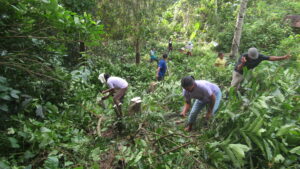
Participants clean and prepare stumped coffee trees during the rejuvenation demonstration in Tanglag, Lubuagan
Participants actively joined discussions on coffee rejuvenation and maintenance, highlighting their existing practices and eagerness to learn improved methods. Forester Himson introduced practical techniques such as proper pruning, stumping, and moisture control using painter’s sheets to ensure healthy regrowth.
Field demonstrations were conducted at local coffee farms, where participants practiced stumping and pruning techniques. They observed how rejuvenation helps increase flowering and fruiting while maintaining optimal tree height for easier harvesting. Farmers also discussed challenges in pest management, fertilizer use, and the effects of climate conditions on coffee flowering and yield.
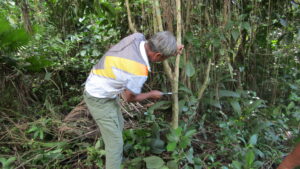
A participant practices stumping their coffee tree during the rejuvenation demonstration.
Improving Quality and Exploring Market Opportunities
The second day focused on enhancing postharvest practices, including proper sorting, drying, and storage of coffee beans. Farmers learned about the importance of separating ripe and unripe cherries, using hermetic bags for safe storage, and building UV-covered dryers for consistent drying.
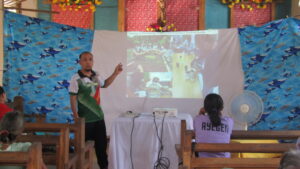
Forester Jefferson A. Himson of Kalinga State University–Coffee Research Center discusses various coffee processing techniques to improve bean quality.
Forester Himson also encouraged participants to engage with the Department of Trade and Industry (DTI) for technical support and access to coffee competitions and marketing initiatives. He emphasized that adherence to proper processing standards could open opportunities for product recognition and market expansion.
Planning for Sustainability
At the end of the training, their organization in Tanglag, TACOUD drafted an action plan for site maintenance, pruning schedules, and future activities. Monitoring of the demonstration sites will be jointly conducted by TACOUD, KSU, and CorDisRDS.
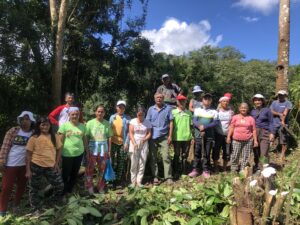
Tanglag Coffee Farmers
Farmers expressed concern about the declining youth involvement in coffee farming and discussed ways to sustain the local coffee industry through knowledge sharing and continued capacity building.
Empowering Farmers, Strengthening Livelihoods
CorDisRDS and KSU awarded certificates and distributed tools to their organization such as pruning shears, saws, hermetic bags, and paints to support continued practice of the techniques learned.
In his closing message, Forester Himson commended the participants’ active engagement and dedication to revitalizing their farms, saying that the experience “rejuvenates both the coffee trees and the farmers themselves.”
Through this initiative, CorDisRDS continues to advance its advocacy for sustainable livelihoods and resilient communities in the Cordillera, empowering farmers to adapt to changing conditions while preserving the region’s rich coffee tradition.

